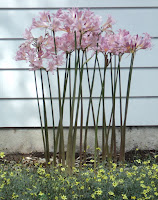DIY AND SELF-HELP
If you lived through The Great Depression (1929-1941, approximately), you have a working knowledge of DIY (Do It Yourself). That working knowledge has very likely been with you all your life.Think about it: unless you have a bevy of servants and hired help doing everything for you, some parts of your life have to be done by--guess who?--YOU. That's Do It Yourself, at its simplest.
Nowadays, DIY refers to all those things we used to hire done: plumbing, wiring, landscaping, housework (including dusting), cooking, auto mechanics (oil changes and such), laundry and ironing (yes, Virginia, some folks still iron clothing and other items). Okay. That's enough listing.
I have to confess: I did not live through the Depression. But my parents did, and my aunts and uncles, some of my older cousins, and my grandparents. So those who grew up in the time I did can call ourselves Second Generation Depression Survivors. We were given a front-row seat in the drama of doing things ourselves--making Life work, making do or doing without, finding answers to questions we never thought we'd ask.
Such as: how can I have a new dress for Easter/the prom/my wedding? In the so-called Good Old Days (when it seemed everybody had money to spend), I would go to the Best Dress Shop, find a nice lady pleased to help me spend oodles of boodle on the absolutely most divine dress for my special day.
Once DIY set in, my options were limited: wear something I already had (unsuitable)--borrow something from a friend (I had no sisters)--not go to the event (unthinkable)--make it myself (my mother didn't sew). So, you guessed it, I did it myself--made my own dress (with new fabric, not salvaged from something in the attic), and wore it, wonky seams and all.
That was during my teen years. Once I'd learned to sew in 4-H, I bought fewer clothes; good thing, too, because I had a very limited allowance, no job during high school, and no rich auntie to "help out" when I needed cash.
[Aside: I won't claim that all this deprivation made me a better person. It did make me a more careful person. After all, if I spent my money on something that didn't last, there was no more money to spend on a better item to replace it.]
You get the idea.
-----
Next: enter Self-Help. Books, magazines, newspaper articles--and later on, TV shows. (Nowadays it's YouTube and podcasts.) You could find out how to do absolutely anything you ever wanted or needed to know. Self-Help, though, unlike DIY, tended to gear itself more toward relationship issues--so if I looked hard enough, I could find out:
- how to make friends
- how to get along with siblings (never had to buy that one)
- how to become more confident
- how to be a good leader
- how to play bridge--and win (never read that one either)
- how to study
- how to improve memory skills
On and on. The how-to books are still being sold: how to write (you name the kind), how to paint (something or other), how to play the piano/violin/zither/kazoo . . . the whole point being--are you ready?--you can Do It Yourself! No teacher necessary. Sit there on your overstuffed sofa and learn anything!
During this continuing time of isolation/shutdown/anxiety & panic, some folks will thrive merely because they can learn to do something, or learn about something, and can keep on keeping on. No teachers necessary. No going outside the house and risk being exposed to a virus. Just turn on the computer and fire up YouTube. Or plug in your ear buds and find the podcast that suits you.
-----
Like my friend Liz Flaherty, I do love full-circle stories. The ending flows perfectly from the beginning. But in this case, I'm not completely sold on the idea that DIY and Self-Help are the way to go. But they're great support systems, when we don't have other options.
Fortunately, DIY has gone 'WAY beyond guys surrounded by every hand-held tool available at Home Depot and gals beavering away at their sewing machines. DIY has long been a part of school classrooms--if you want to see just how far we've come, do a search on DIY Clip Art and see what comes up. (Prepare to be amazed.)
-----
Even in this isolationist time, due to COVID, learning still goes on--virtually, often, but there's a teacher there, in most cases, leading a class. Even introverts like me want to see someone demonstrating a skill or at least speaking (always seems like he/she is speaking to me, personally).
Bottom line: We need each other.
I don't want to abolish DIY or Self-Help. They're lifelines sometimes. They call on our creative natures to get into the act. If you can do it yourself or find a place to explain how it's done, you won't give up. Sometimes, that's enough. But don't forget, another person can help, too.
Blessings,
Thursday's Child
 |
| DIY Pizza, anyone? |
 Friendship is unnecessary, like philosophy, like art... It has no survival value; rather it is one of those things that give value to survival. --C. S. Lewis (1898-1967)
Friendship is unnecessary, like philosophy, like art... It has no survival value; rather it is one of those things that give value to survival. --C. S. Lewis (1898-1967)





.png)










